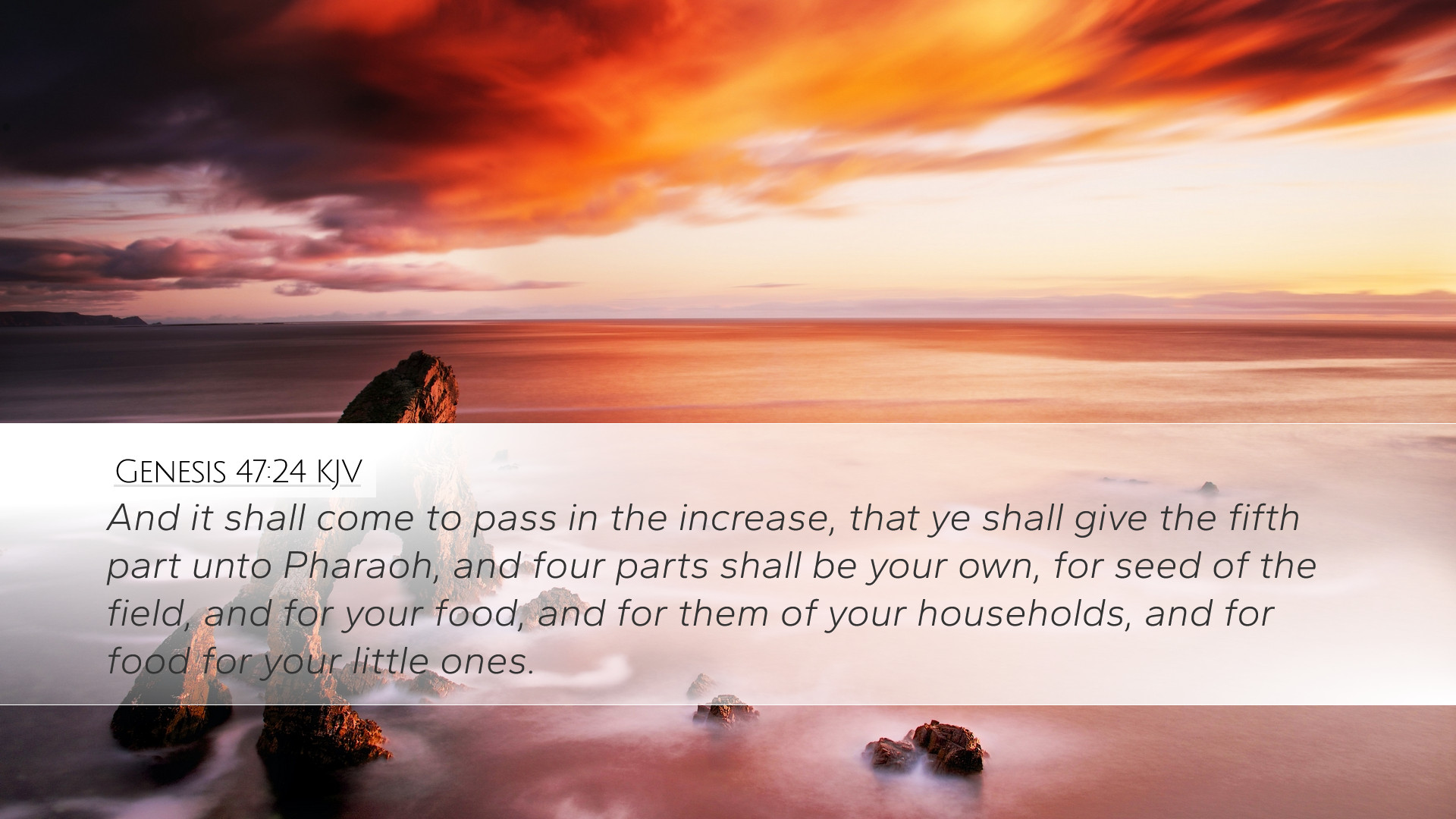Bible Commentary on Genesis 47:24
Genesis 47:24 (KJV): "And it shall come to pass in the increase, that ye shall give the fifth part unto Pharaoh, and four parts shall be your own, for seed of the field, and for your food, and for them of your households, and for food for your little ones."
Introduction
This passage occurs within the narrative of Joseph's administration in Egypt during a time of famine. The context of this verse reveals not only Joseph’s wise management of resources but also highlights significant themes regarding governance, stewardship, and trust in divine providence.
Commentary Insights
Understanding the Context
This verse is part of a broader account where Joseph prepares Egypt for the impending famine by gathering food and later redistributing it during the times of scarcity. The proposed fifth part, as tribute to Pharaoh, reflects a newfound governmental structure designed to sustain the population.
Joseph's Administrative Wisdom
- Matthew Henry: He emphasizes Joseph’s prudence and foresight in managing the resources, noting that Joseph transformed a crisis into an opportunity for both Egypt and its people. By instituting this fifth part as a tax, Joseph ensured that the needs of the populace were met while maintaining the stability of Pharaoh’s treasury.
- Albert Barnes: Barnes highlights Joseph's strategy of ensuring that the land and its people remained productive. By allowing the citizens to retain four parts of their harvest, Joseph not only provided for their immediate needs but also motivated them to work the land, preserving its productivity for future generations.
- Adam Clarke: Clarke focuses on the categories outlined for the retained resources, depicting them as essential for sustaining life. He remarks on the social implications of this taxation, especially upon families, and how it served to maintain order and feeding the vulnerable within society.
Theological Implications
In examining the depths of this administration, several theological implications arise that are pertinent for pastors and theologians today:
- Divine Providence: The handling of famine reflects God’s overarching providence. Joseph’s ability to foresee the famine and manage it serves as a reminder of God’s faithfulness to His people, overlooking their plight even in dire circumstances.
- Stewardship: The quarterbacking of resources by Joseph offers a model of stewardship, urging believers to recognize the balance between divine provision and human responsibility. The fifth part that is given unto Pharaoh symbolizes the recognition of authority and the ordered society for the common good.
- Trust in Governance: Joseph’s role emphasizes the importance of trust in governmental structures established for the welfare of the people. It prompts a reflection on contemporary governance and how Christians are called to interact with political frameworks.
Practical Applications
Leaders, students, and theologians can extract several practical applications from Genesis 47:24:
- Responsible Leadership: Joseph’s example encourages today’s leaders to act wisely under pressure and to make decisions that benefit both their people and their authorities, ensuring mutual respect and cooperation.
- Community Care: The emphasis on providing for households and children teaches the necessity of community concern. Believers are called to strengthen families and safeguard their well-being, reflecting God’s heart for the vulnerable.
- Economic Principles: The methods illustrated in this passage indicate the need for prudent economic policies that balance taxation and sustenance. Discussions on societal finances should reflect a biblical understanding of resource allocation.
Conclusion
Genesis 47:24 encapsulates potent lessons from a historical and theological perspective. By understanding the economic measures put forth by Joseph and their implications on society at large, readers are prompted to reflect on their roles within their communities, the importance of stewardship, and their relationship with governmental authorities. Furthermore, this narrative continues to resonate with themes of divine providence, challenging past and present believers to trust in God's plans for sustenance amid trials.


